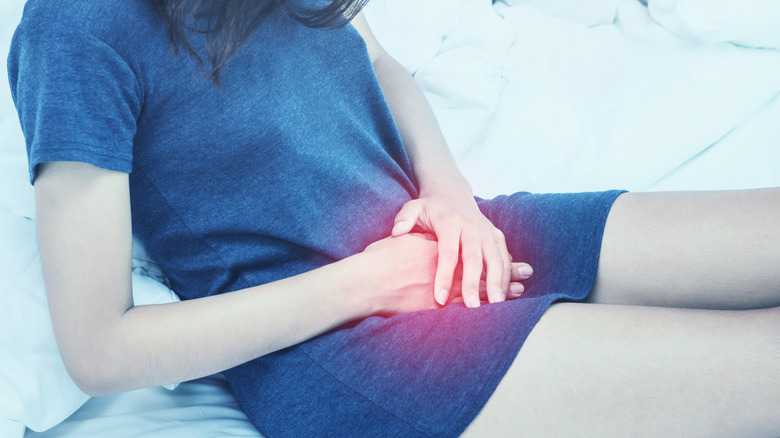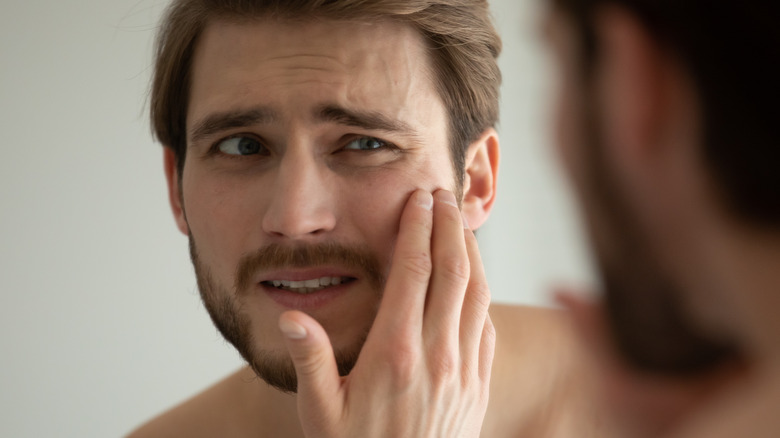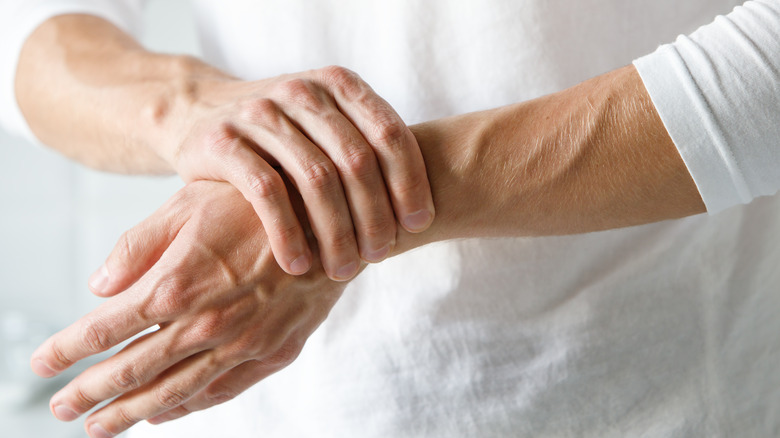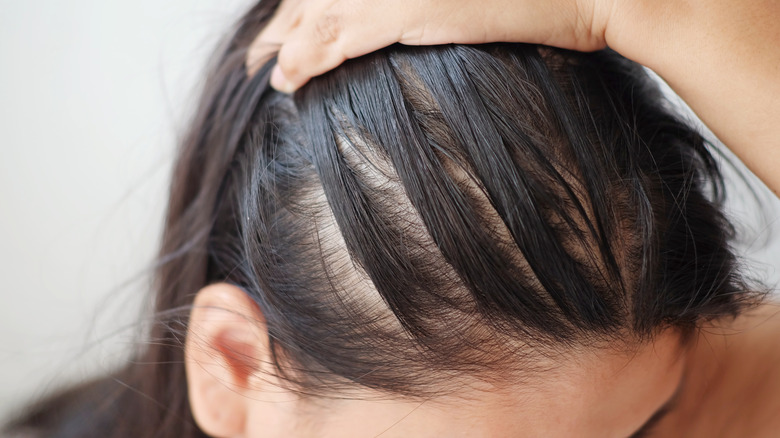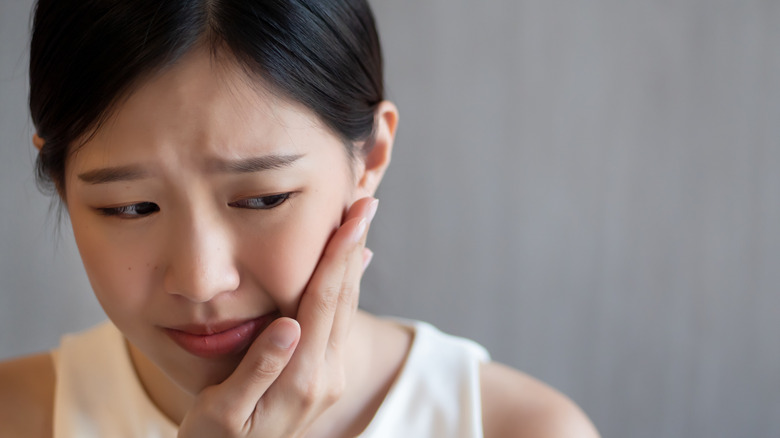Things That Happen To Your Body After You Turn 40
Hitting 40 is a major milestone. Your 40s are technically the beginning of midlife (via Psychology Today), even though you might still feel young at heart. But it's after making it over the 40 hump that many people start to experience significant changes to their bodies. And these changes happen to the best of us, like packing on pounds more easily than before and feeling more aches and pains in our bodies. Aging is a normal process, so it's not necessary to be alarmed with every change you spot. According to WebMD, normal things that happen when we age include some vision and hearing loss, drier skin, feeling a little weaker, and losing some bladder control. Keck Medicine of USC adds that a loss of estrogen can present women with a few extra problems, like hot flashes and sleep troubles. They're not fun issues to have, but they're normal.
Below, we'll cover several common changes you might notice as you move through your 40s. Of course, if you have any concerns that something is off, it's a good idea to discuss them with your doctor.
Your muscle mass decreases
After you hit 30, your muscle mass begins decreasing with age (per Harvard Health Publishing). In fact, it may even decline by as much as 5% per decade. This age-related decrease is known as sarcopenia, and it could become problematic for those who don't take steps to counteract it. Losing muscle mass often makes people more prone to weakness that could lead to falls and bone fractures. Getting enough protein in your diet and building muscle through strength exercises are key ways to combat age-related muscle loss.
Researchers have also conducted studies to determine some of the best ways to prevent significant muscle loss with aging in addition to exercising. Taking creatine supplements is one method that's been studied in-depth, and some research shows promise. Dónal P. O'Mathùna, lecturer in Ethics, Decision-Making & Evidence at Dublin City University, reviewed several creatine-related studies, explaining their results in an Integrative Medicine report. Some studies suggested that creatine supplementation, with or without resistance training, had beneficial effects on muscle mass for both women and men.
It's easier to gain weight
Have you found your waist size or scale number creeping up slowly after hitting 40? Weight gain is one of the easiest changes to spot around this age, especially because it seems as though the body changes even if we don't make changes to our diets or exercise routines. A primary reason for this is that the body is less efficient at removing fats, also known as lipids, as we age, explains the researchers behind a 2019 study published in Nature Medicine. Regardless of whether the study's participants gained or lost weight over the 13-year study, they all demonstrated decreased lipid turnover in fat tissue.
Does that mean you're destined to buy larger pants for the rest of your life? Not necessarily. Being mindful of what you eat and continuing a regular exercise regimen can help you keep your weight in check (per WebMD). Some people may benefit from cutting some calories from their daily intake, while others might cut out sugary drinks to keep their weight on the right track. And don't forget to relax. The less stressed you feel, the easier it is for your body to do what it needs to do.
UTIs may become more common
Urinary tract infections can range from mild to severe, but none of them are fun. Common UTI symptoms include a burning feeling when you urinate, passing small but frequent amounts of urine, and cloudy urine (via Mayo Clinic). Any UTI should be treated by a doctor, but a high fever, vomiting, and severe pelvic or back pain can indicate a more serious UTI infection that may require different treatment.
Although these pesky infections can occur at any age, the midlife years can make them more common for many (per Harvard Health Publishing). Some people may even experience recurrent infections, especially women. This happens because of the many changes in the body during this time, including incontinence and lower estrogen levels. Editor in Chief of Harvard Women's Health Watch Hope Riciotti suggests adding cranberry supplements to your diet, being sure to fully empty the bladder when urinating, and emptying the bladder after sexual intercourse to lower some UTI risk.
You feel new aches and pains
We joke about our backs hurting once we get "old," but there is some scientific truth behind those new aches and pains. Physician Alexis Tingan tells Penn Medicine that it starts to become more normal to experience back pain between 40 and 60 years old. The achiness can come from conditions that also become more common with age, like spinal stenosis, ruptured or herniated discs, and arthritis. However, Tingan warns that "back or neck pain that's so severe that it's debilitating needs to be checked out by a physician." Symptoms like fever, numbness, or leg pain that accompany back pain are warning signs that something more serious is going on.
Though aches and pains are a normal part of aging, geriatric medicine internist Sonia Sehgal tells UCI Health that it's important to pay attention to your body to catch not-so-normal symptoms, especially if they come on suddenly or are unusually severe. For instance, having regular headaches when you used to rarely get them, extreme exhaustion or fatigue, sudden difficulty breathing, chest pains, and tingling or numbness in your hands or feet all warrant a trip to the doctor to rule out underlying causes.
Your facial skin shows its age
Around the age of 40, you might start noticing some differences in your face. Wrinkles, fine lines, and eye bags are more common to see now (via Harvard Health Publishing). Why? Basically, your facial skin is aging, too. All the years of being out in the sun, shaving, or using makeup can take a toll on your skin. Even if you've been diligent about washing and moisturizing your face, there's still damage that could begin to show soon.
There's a lot going on beneath the surface of the skin that contributes to its aging. The muscles you constantly use to make facial expressions weaken over time, which can cause wrinkles or sagginess. And as you age, the fat underneath your skin decreases, which is why you'll see more creases and fine lines than you once did. Keeping up a regular skincare routine can help slow down facial skin aging, so remember to wear sun protection daily and moisturize your skin after washing it.
You could experience hand pain
Our bodies have been through a lot by the time we reach 40, but a couple of body parts you might not have predicted would start acting up on you in your midlife years are your hands and wrists. This pain or tingly feeling is often caused by carpal tunnel syndrome, which could make it difficult for you to complete work or personal tasks (via Medline Plus). Carpal tunnel syndrome often affects people between 40 and 60, although it could happen even earlier for some. Some people might have only one hand affected, while others experience pain in both. Symptoms can also vary between both hands but most often include pain or numbness in the wrist, palm, and fingers. Lifestyle factors, like what you do for work or hobbies, play a significant role in carpal tunnel syndrome development. But the condition also sometimes occurs with other health problems, like diabetes and rheumatoid arthritis.
Your hair might start thinning
Whether you're a man or woman, you might start noticing some grays sneaking into your hairline in your 30s or 40s (via Harvard Health Publishing). But in your 40s, you might also notice that your hair feels a bit thinner than it once did. According to the American Hair Loss Association, about two-thirds of men will notice hair loss by the age of 35.
While many people think of men as the usual hair-loss sufferers, women can also experience it. A letter published in the Journal of the American Academy of Dermatology notes that as many as 40% of women will experience female pattern hair loss (FPHL) by the time they reach 50. In the letter, the authors also noted a study that showed prevalence between FPHL and high total testosterone levels and hypothyroidism. Other potential causes of FPHL include stress, tight hairstyles, inflammation, hormone changes, and medications (per Harvard Health Publishing). Genetics may also play a role, similar to a common cause in males. Androgenic alopecia is one genetic condition that can cause a widened hair part.
Women's periods can become irregular
In their 40s, women will typically exhibit symptoms of perimenopause, the window of time before experiencing actual menopause (via Mayo Clinic). A common indicator of perimenopause is an irregular period. Some women may notice that their periods become longer, shorter, lighter, or heavier, and other women skip periods altogether. Hot flashes, mood changes, and sleep troubles can also be signs of perimenopause.
Perimenopause and symptoms like irregular periods tend to happen because of hormonal shifts that occur at around age 40. However, JoAnn Pinkerton, Director of the Division of Midlife Health at the University of Virginia Health System, tells WebMD that women can be proactive to combat some of the side effects of these changes. According to Pinkerton, "Women who are able to maintain a regular exercise routine, eat healthy, and manage their stress — because stress can make perimenopausal symptoms worse — may find that the perimenopausal transition is a bit easier for them."
You might experience brain fog
If you're a woman in her 40s, you might have another issue to deal with: brain fog (via Healthline). Brain fog is a blanket term for feelings of forgetfulness or a lack of concentration. You might forget what you were going to do or say or have trouble focusing on a task. This is typically a symptom of menopause, which is why it's particularly common in women in this age group. However, Harvard Health Publishing notes that everyday stressors and sleep problems can also contribute to brain fog in both men and women.
When you experience brain fog, you might actually feel as though you're losing your memory. But there are key differences between brain fog and dementia, which naturopath Lynn Shinto points out to the OHSU Center for Women's Health. According to Shinto, forms of dementia affect your daily life more than brain fog. They could even interfere with usual daily tasks, like keeping up with your banking or engaging in social activities. If you think your "brain fog" is affecting the things you'd usually do, it's time to have a conversation with your doctor.
Your teeth and gums might become less healthy
When you age, your teeth and gums age with you, and you might notice some changes in your gum health through your 40s. MedlinePlus explains that these oral changes happen with age because cell renewal slows, bones become less strong and more porous, and gum tissue becomes thinner. The immune system also isn't quite as efficient as it's been, so infections can be more problematic.
The Journal of the American Dental Association published 2018 data showing that dental health can even begin declining in your 30s. According to the study, approximately 42% of adults 30 or older in the United States have periodontitis. Of those, about 7.8% were classified as having severe periodontitis. This is all bad news for your teeth and gums, making it crucial to keep on top of regular dentist appointments. If you suffer from chronic periodontal problems, many dentists will recommend that patients return every three months instead of the usual six-month schedule to keep up on maintenance (per the British Dental Journal).
Your bladder might leak
Women commonly experience mild to moderate bladder leaks as they age, especially after having children or entering menopause (via Cleveland Clinic). But men and women alike can have bladder leaks due to aging of the muscles that support the pelvic organs — as these muscles weaken, they're less able to control the bladder's operation. People can also experience different types of incontinence, like stress incontinence from sudden movements like coughing or exercising, or urge incontinence, where you feel the need to urinate and can't get to a restroom quickly enough.
While it's common with aging, urogynecologist Pamela Fairchild tells Michigan Health that you don't need to just deal with urinary incontinence. In some cases, she explains, it could even be a sign of an underlying condition that needs to be checked out. For example, diabetes and heart problems could be culprits. For others, making dietary changes, like drinking less during the day or increasing fiber intake, can lead to a better functioning bladder.
Your brain could feel less happy
You've likely heard of the supposed midlife crisis that hits people in their 40s or 50s. While this phenomenon doesn't happen to everyone, there is a good possibility that you might feel more anxious or unhappy as you approach 50. Research from economics professor David G. Blanchflower suggests that the average age for people in advanced countries to feel their lowest, happiness-wise, is 47.2. The age is a bit higher at 48.2 in developing countries. What does this mean for you? It may not mean anything, but it could foreshadow what to expect as you get further into your 40s.
CEO of the Society for Human Resource Management Johnny Taylor tells CNBC Make It that this decline in happiness in the midyears could result from being a part of the sandwich generation that cares for both kids and elderly parents. "Financially, they may be helping to support the health care needs of their parents, while simultaneously paying for their kids' education," Taylor explains. Taylor also notes that people usually experience their peak in work achievements around this age, which could put a damper on their future career outlook and lead to lower satisfaction at work and in life in general.
Your taste and smell might change
Like your skin and sexual habits, your taste may change with age. A 2015 study published in Chemical Senses explored self-reports of taste and smell changes in people 40 or older. Of the participants, 23% reported having problems with their sense of smell, while 19% experienced problems with taste. Another 10% noted only experiencing trouble tasting food as they aged.
What gives? According to a Mayo Clinic write-up from internal medicine expert Paul Y. Takahashi, several factors can affect taste and smell with age. Although many people don't start noticing differences in these senses until after 60, 40-year-olds can experience problems if they have dental issues, smoke cigarettes, or take medications that interfere with the senses. Alzheimer's and Parkinson's diseases can also contribute to sensory declines. Takahashi stresses the importance of bringing up your symptoms to your doctor. Letting a loss of taste or smell go without help can lead to poor diet management that can cause other health issues.




